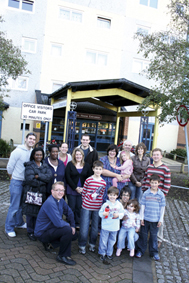Congregation to meet in tower block
IT’S a risky venture – but one that will put a city-centre church on the frontline of mission.

Some of the congregation from St Luke's Church outside Wilmcote House
The entire congregation of St Luke’s Church in Portsmouth is moving out of its church building and will meet on Sunday mornings in a tower block nearby.
They aim to make it easier for Somers Town residents to join them, by meeting in a more visible place and by offering more creative styles of encountering God. The congregation’s new format starts on November 29 in Wilmcote House, Hyde Park Road, and will be called ‘The Sunday Sanctuary’.
It follows a month-long trial in June, when the congregation met in Wilmcote House for four successive Sundays. One family who live there joined them and the worship attracted the interest of locals.
The move is part of the ground-breaking work done by city centre pioneer minister the Rev Mark Rodel, who is also associate priest at St Luke’s.
“Our vision is to be a mission community that plants congregations,” he said. “The aim is to detach ourselves from our church building, spend time in a particular place, and to see local people join us.
“When that congregation is sustainable, we may move on and create another small congregation elsewhere. Ultimately we’d like to see a network of small, local congregations in this area.
“This is about taking seriously the call to be where people already are, rather than expecting them to come to us. It’s a physical and a cultural change, in that we’re not just moving location, but also hoping to create space to encounter God in a creative way that is easy for others to access.
“We often expect people to cross the threshold of our churches and immediately start singing or speaking words that they don’t yet believe or understand. Our gathering will be much more conversation-based. People will share their experiences and others will be able to ask questions.
“We aren’t abandoning our church building – we just won’t have Sunday worship there. There are still groups who use it, and there are plans to use the building more creatively. But we’re being set free from the limitations of that building, and the building is being set free to be re-imagined.
“The 20 or so in our congregation are moving forward with cautious enthusiasm. This is a massive step, and there is excitement and trepidation. We recognise that it’s a risk, but we think it’s a risk worth taking.”
During the four-week trial at Wilmcote House, one way of praying they used was to write or draw prayers on the windows using erasable marker pens. It helped that worshippers could see where people were living as they prayed for them. It also helped that locals could peer through the windows to see what was going on before deciding whether to join in.
The new venture will become a ‘fresh expression’ of the Church. The Archbishop of Canterbury, Dr Rowan Williams, has encouraged our churches to create such innovative fresh expressions alongside mainstream churches as part of a ‘mixed economy’ approach to church life. Among the Fresh Expressions in our diocese is a Café Church to be launched in Waterlooville’s Costa Coffee shop in January.